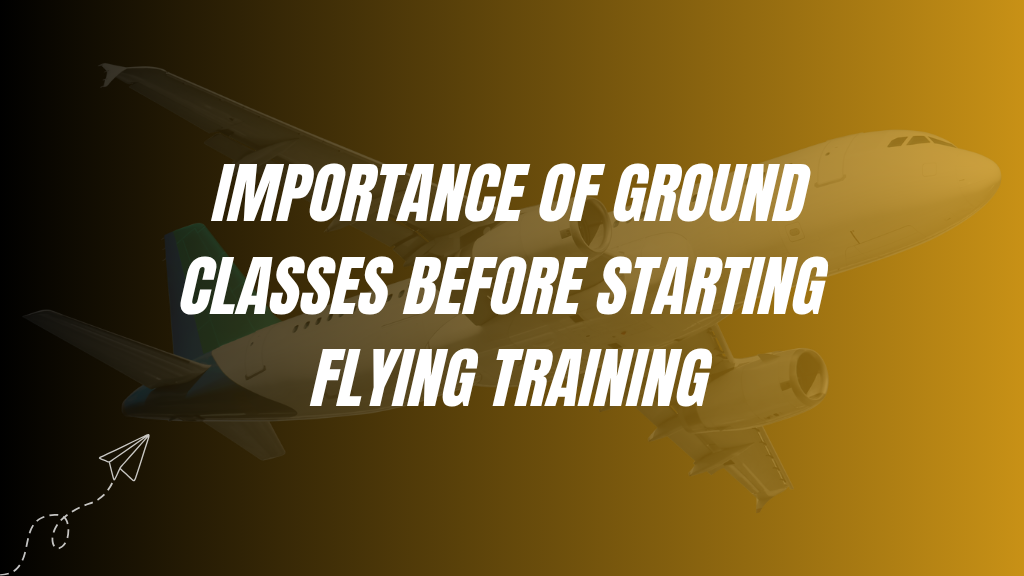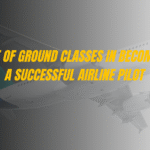
Aviation has always fascinated humans, offering the thrill of soaring through the skies and the prestige of commanding an aircraft. Every aspiring pilot dreams of the cockpit, but the journey to becoming a skilled aviator begins far before the first takeoff. Before you even step onto the runway for flying training, a crucial step lays the foundation for a successful aviation career: ground classes.
Ground classes are often underestimated by beginners who are eager to fly. However, these theoretical lessons are the backbone of safe, effective, and efficient flying training. They provide the knowledge, confidence, and skills necessary to navigate the complexities of modern aviation. Institutions like Top Crew Aviation emphasize the importance of ground classes to ensure that every student develops a strong foundation before taking to the skies.
What Are Ground Classes in Flying Training?
Ground classes, sometimes referred to as theoretical training, encompass a wide range of subjects essential to understanding the principles of flight. While flying training focuses on practical skills, ground classes cover the “why” and “how” behind every maneuver and decision.
Key topics in ground classes include:
- Aerodynamics: Understanding how and why aircraft fly.
- Aircraft Systems: Learning about engines, navigation, instruments, and electrical systems.
- Meteorology: Understanding weather patterns, wind, storms, and their effects on flight.
- Navigation: Using maps, charts, GPS, and instruments to safely reach destinations.
- Aviation Regulations: Familiarity with local and international aviation laws.
- Communication: Effective use of aviation radio communication protocols.
- Safety Procedures: Emergency protocols, risk management, and accident prevention.
Ground classes ensure that every student pilot develops a comprehensive understanding of these concepts, preparing them for real-world flying training scenarios.
Why Ground Classes Are Essential Before Flying Training
1. Building a Strong Theoretical Foundation
Flying is not just about handling the controls; it’s about understanding the mechanics of flight. Ground classes provide this essential knowledge, helping students grasp why aircraft behave a certain way under specific conditions. For example, knowing the principles of lift, drag, and thrust allows a student pilot to anticipate how their aircraft will respond to different maneuvers.
Institutes like Top Crew Aviation integrate detailed ground classes into their curriculum to ensure students have a solid theoretical foundation. This foundation makes practical training smoother and more intuitive.
2. Enhancing Safety Awareness
Aviation is inherently complex and carries risks. Ground classes equip students with knowledge of potential hazards and teach strategies to mitigate them. Understanding emergency procedures, aircraft limitations, and risk assessment is crucial for every pilot. By attending ground classes before flying training, students develop a mindset focused on safety, reducing accidents and increasing confidence in the cockpit.
3. Boosting Confidence in Flight
Confidence is a key factor in successful piloting. Students who begin flying training without prior theoretical knowledge often feel overwhelmed, leading to stress and mistakes. Ground classes familiarize students with aviation terminology, flight instruments, and procedures, allowing them to approach their first flights with confidence and clarity.
4. Preparing for Licensing Exams
Before becoming certified pilots, students must pass written examinations covering aviation theory. Ground classes are designed to prepare students for these critical tests. By mastering concepts such as navigation, meteorology, and aviation laws, students increase their chances of passing the exams on the first attempt, streamlining their flying training journey.
5. Reducing Training Time and Costs
Investing time in ground classes can actually shorten the duration of flying training. Students with strong theoretical knowledge require fewer flight hours to master practical skills. This not only saves time but also reduces the cost of training, making aviation education more efficient and accessible.
6. Developing Critical Thinking Skills
Flying is not just about following instructions; it’s about making quick, informed decisions in dynamic environments. Ground classes challenge students to think critically, analyze situations, and solve problems effectively. These skills are invaluable during real-flight situations, enhancing the overall quality of flying training.
Read Also – DGCA Ground Classes vs FAA/EASA Ground Classes – Key Differences
How Top Crew Aviation Excels in Ground Classes
When choosing an aviation training institute, the quality of ground classes is a decisive factor. Top Crew Aviation is renowned for its holistic approach, combining rigorous ground classes with hands-on flight experience. Their curriculum ensures that students are well-prepared, confident, and safety-conscious.
Some of the key features of Top Crew Aviation’s ground training program include:
- Experienced instructors with real-world aviation expertise.
- Interactive sessions that combine theory with practical simulations.
- Advanced flight simulators for safe, realistic practice.
- Personalized training plans catering to individual student needs.
- Strong focus on safety, regulations, and emergency protocols.
By prioritizing ground classes, Top Crew Aviation ensures that students are not just prepared to fly but are prepared to excel in their aviation careers.
Real-Life Benefits of Ground Classes
The benefits of ground classes extend beyond exams and flight hours. Pilots trained in comprehensive ground classes are:
- Better at handling emergencies: Knowing what to do under pressure can save lives.
- Efficient in flight planning: Understanding navigation and weather allows for precise and safe flight paths.
- More adaptable to new technology: Pilots with strong theoretical knowledge adapt faster to advanced aircraft systems.
- Highly employable: Airlines value pilots with strong foundational knowledge and safety awareness.
Conclusion
Ground classes are the cornerstone of any successful flying training program. They provide the knowledge, skills, and confidence needed to navigate the complexities of aviation. Without them, aspiring pilots risk inefficiency, increased training costs, and compromised safety.
Institutions like Top Crew Aviation understand this critical step and provide comprehensive ground classes as an integral part of their training programs. By combining theory with practical experience, they produce pilots who are confident, knowledgeable, and prepared to handle the challenges of modern aviation.
For anyone serious about a career in aviation, investing time in ground classes before starting flying training is not optional—it is essential. It’s the first step toward not just flying an aircraft, but mastering the art and science of aviation.
Frequently Asked Questions
What are ground classes in flying training?
Ground classes are theoretical lessons covering aviation principles, navigation, meteorology, aircraft systems, and safety before practical flying.
Why are ground classes important before flying training?
They build a strong knowledge foundation, enhance safety awareness, boost confidence, and prepare students for licensing exams.
How do ground classes help in pilot licensing exams?
Ground classes cover essential theory required for written exams, increasing the chances of passing on the first attempt.
Can I start flying training without ground classes?
Technically yes, but skipping ground classes can reduce safety, confidence, and efficiency, making training more challenging and costly.
Which aviation institute offers the best ground classes?
Institutes like Top Crew Aviation provide comprehensive ground classes integrated with practical flying, ensuring well-rounded pilot training.



